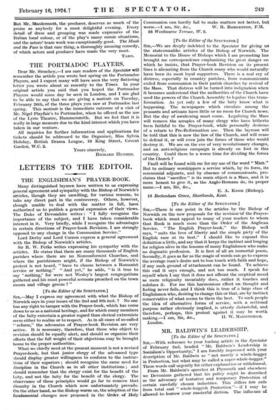[To the Editor of the SPECTATOR.] Sin,—We are deeply indebted
to the Spectator for giving us the statesmanlike articles of the Bishop of Norwich. The Memorial to the House of Bishops which I am promoting has brought me correspondence emphasizing the great danger on which he insists, that Prayer-book Revision on its present lines is alienating from the Church many who would naturally have been its most loyal supporters. There is a real cry of distress, especially in country parishes, from communicants exiled from communion in their parish churches by revival of the Mass. That distress will be turned into indignation when it becomes understood that the authorities of the Church have used the powers of the Church Assembly to legalize this trans- formation. As yet only a few of the laity know what is happening. The newspapers which circulate among the peasants and artisans have little or no room for Church news. But the day of awakening must come. Legalizing the Mass will remove the scruples of many clergy who have hitherto been faithful to the Prayer-book, while personally desirous of a return to Pre-Reformation use. Then the layman will be told that this is now the law of the Church, and will cease to defend it, or will even join the forces of those who would destroy it. We are on the eve of very revolutionary changes, and an anti-religious campaign is already on foot in this country. Could there be a worse time for dividing the forces of the Church ?
Fault will be found with me for my use Of the word " Mass."
But to ordinary worshippers a service which, by its form, its ceremonial adjuncts, and by absence of communicants, pro- claims that "sacrifice" is its main object is a Mass, and it is more honest to give it, as the Anglo-Romans do, its proper name.—! am, Sir, &c., E. A. Kwox (Bishop).
18 Beckenham Grove, Shortlands, Kent.










































 Previous page
Previous page